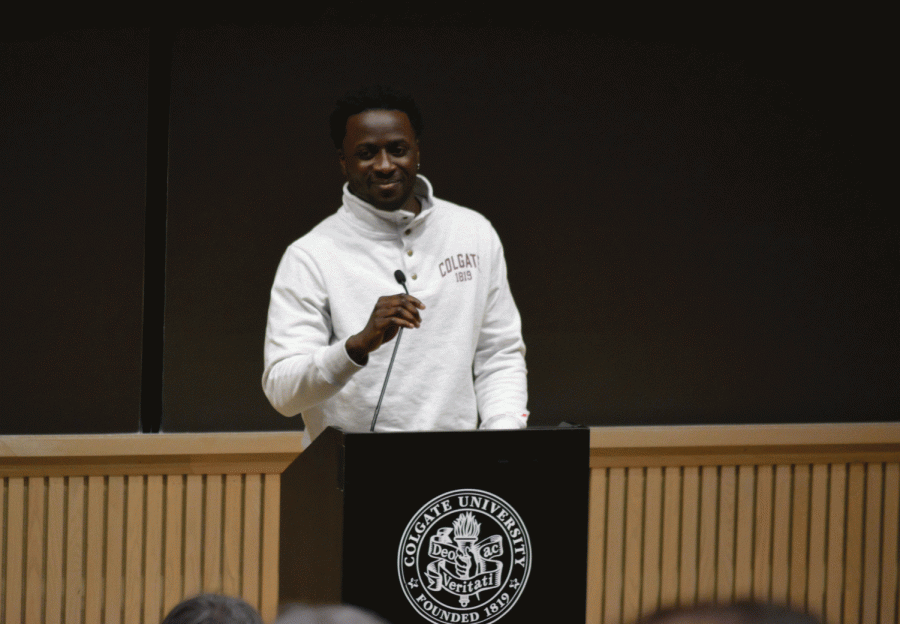Adjei-Brenyah Addresses American Apathy
Nana Kwame Adjei-Brenyah visited Colgate on November 15 as the penultimate author of the Living Writers series. He read from “Friday Black,” his satiric and somewhat dystopian collection of stories centered around themes of racial violence and consumerism in America. Released in October, the genre-warping book has already gained meteoric attention, landing Adjei-Brenyah a ranking on the National Book Foundation’s “5 Under 35 Authors” as well as a front-page review in The New York Times.
Before this breakthrough, Adjei-Brenyah graduated from SUNY Albany and received his MFA in fiction from Syracuse University. In 2016-2017, he was chosen as one of Col- gate’s Olive B. O’Connor fellows in fiction, taught two courses at Colgate and finished writing “Friday Black.” He likened his return to the familiar faces of Colgate to a much- needed break from the “speed dating” that a book tour can often feel like.
While on campus, Adjei-Brenyah read “The Era,” a dystopian story focused on empathy in a technologically-advancing world. Ben, a “clear-born,” tries to find his place in an OptiLifeTM future where emotions can be genetically modified. The character’s addiction to “Good,” a drug that mitigates feeling, and his eventual withdrawal from it lead to a hopeful ending in which he begins the process of reconnecting to his own emotions and those of other humans.
The book analyzes the theme of empathy and its lack thereof in America. The eponymous story, set in a shopping mall on Black Friday, uses commonplace deaths and violent
stampedes as an absurdist twist on the pseudo- holiday. Humans, likened to animals, abandon their sense of emotional connection in a crazed obsession with material items. They lose cognitive abilities such as speech and gain a savage disregard for their own and others’ safety.
This absurdist tone is present throughout the collection, often to aid Adjei-Brenyah in critiquing the current American mind- set on racial violence. In “The Finkelstein 5,” a man cuts the heads off of five innocent black children, only to be acquitted by a mass-media trial. Though a seemingly impossible scenario, the story bears similarities to modern cases, including the Trayvon Martin–George Zimmerman trial.
“It was incredible to read his stories and see the connections to today. Everything was turned up a few notches, but the implications about our own society were clear,” sophomore Gianna Irwin said.
Adjei-Brenyah said he doesn’t try to hide from these modern political applications and that he can’t imagine what an apolitical story would look like. He wants his pieces to address issues head-on and make readers recognize the current atmosphere.
“If the house is on fire, why write about what’s in the fridge?” he asked.
After his reading, Adjei-Brenyah ended the visit by answering questions from the audience regarding his publishing process, writing style and choice of young narrators. He signed books outside Love Auditorium, and a long line formed for such a fresh voice in literature with a successful, burgeoning career to come.
Contact Andrew Kish at [email protected].







